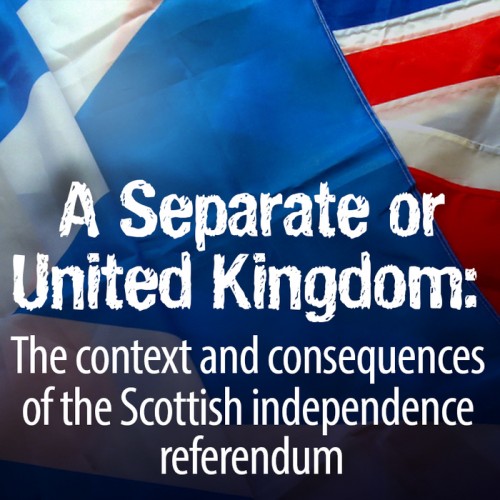On 25 March this year, a bill disenfranchising around 4 million people was introduced to Parliament. It barely received any press coverage, and though it was defeated it raised an important and oddly neglected constitutional question.
The bill in question was proposed by Tory John Stevenson, and asked “that leave be given to bring in a Bill to amend the Representation of the People Act 1983 to disenfranchise all residents of Scotland eligible to vote in any United Kingdom General Election held after 18 September 2014 in the event of a positive vote in the Scottish Independence referendum; and for connected purposes.” It attempts to solve an anomaly caused by the electoral calendar: Scotland votes on independence on 18 September this year, but would only become an independent nation some time in 2016 (the Scottish government is planning for 24 March). In between those two dates, of course, the UK will hold a general election. Some Conservatives argue that Scots shouldn’t return MPs to Westminster in 2015 because most laws passed by the 2015 Parliament will not apply to Scotland. The problem is exacerbated by the Labour Party’s dominance in Scottish constituencies: 2015 could well see a Labour majority in Westminster and a Conservative majority in ‘rump UK’, i.e. the United Kingdom minus Scotland. In this situation – one of the most likely outcomes of the general election – by whom would Britain be governed?
Tories were ordered to abstain on Stevenson’s bill, and Labour MPs predictably turned out to defeat it. Following a ‘yes’ vote in September, Cameron might see the advantage in disenfranchising the Scots, but a similar bill would almost certainly fail again. The Liberal Democrats could be counted on to oppose it, as it would not only endanger 11 of their MPs, but also diminish the chances of a hung parliament (the Tories won an outright majority in rump UK in 2010, and probably will in 2015). In the absence of a disenfranchisement bill, Scotland will return MPs as normal. As the Scottish government argues, Scotland will be entitled to – and in need of – UK-level representation during the negotiation period.
The silence on this issue has been notable. Unionists of all major parties have ignored the possibility of a ‘yes’ vote (hence there has been precious little planning for the independence settlement) and the UK government removing Scottish suffrage would not do the ‘no’ campaign any favours. Those who have given the matter a little thought seem to assume that Scottish MPs will resign en masse on the date of independence: this might or might not trigger a change of government, depending on the party balance in the Commons.
So what if there was a small Labour majority after 7 May 2015, dependent on Scottish seats? This government would fall after such a mass resignation, and either a general election or a Conservative (or coalition) government would follow. It would be up to the monarch to appoint a new Prime Minister, or dissolve Parliament triggering another general election.
However, there is no guarantee that Scottish MPs will resign on 24 March 2016, given a ‘yes’ vote and smooth independence negotiations. The British Parliament has the power to determine the qualifications of its members. A Labour majority could, therefore, legislate to clarify the situation, and potentially retain Scottish MPs until the next UK general election. This may be difficult to sell to English, Welsh and Northern Irish voters (though perhaps easier due to the Fixed-term Parliaments Act: it could be argued that a norm had been established that MPs were elected for five years), but would clearly be in Labour’s interest. A government which knew it had 10 months to run would not have a chance of implementing any sort of radical programme. For one thing, the House of Lords could delay bills for a year, effectively vetoing them.
What about a Labour/Liberal Democrat coalition? A plausible (if not the most likely) result of the next general election is that Labour are the biggest party in the Commons, but lack a majority; the Conservatives are the biggest (or even majority) party in rump UK, and the Lib Dems could give Labour, but not the Tories, a Commons majority (the reverse of 2010, when they could give the Tories, but not Labour, a majority). In this situation, Labour would want to keep the Scots on for as long as possible. If the Conservatives held a rump UK majority, the Liberal Democrats would have the same incentive as Labour: once the Scots left, they would surely be out of government. In this case, just like under the small Labour majority scenario, legislation could be passed to retain the Scots.
If the Conservatives were merely the biggest party in rump UK, but lacked a majority – i.e. rump UK would also have a hung parliament – the Liberal Democrats could switch sides after the departure of the Scots, and remain in power. Only Labour would have an incentive to retain Scottish MPs. In this situation, the Liberal Democrats would be in a strong bargaining position over Labour: in return for voting to keep the Scots in the Commons, they could win big concessions. Electoral reform would be the traditional demand.
Alongside disenfranchisement, mass resignation and legislation to retain, there is of course a fourth scenario: though no legislation is passed to retain them, the Scottish MPs continue to turn up to the Commons and vote. There is no rule that says they have to go. If Labour had a majority (even a majority dependent on Scottish MPs) it need not fear a defeat from an opposition motion, assuming it could prevent rebellions. A Labour/Liberal Democrat coalition would be more likely to legislate, Labour needing to prevent the possibility of the Lib Dems switching sides. This ‘affront to English democracy’, as the Conservatives might brand it, might appal voters so much that the Speaker, or the Supreme Court, feels obliged to intervene. An American-style legislative/executive versus judiciary battle could result.
Labour would probably not do as I argue they theoretically could, and retain the Scottish MPs, either by legislation or inaction. An (English) public outcry, as noted in the previous paragraph would be feared, and the Labour leadership might feel democratic principle dictates that they do not govern rump UK without a rump UK majority. If they signalled they wouldn’t do so, two immediate points of interest come to mind: 1) If Labour were the largest party, or even in a whole UK majority, but the Tories were the largest rump UK party, the Liberal Democrats could more easily claim a renewed coalition with the Conservatives was preferable to a centre-left alliance, since a government that would lose its majority within a year would be unable to govern effectively; 2) A Labour or Labour-led government following a ‘yes’ vote would have an incentive to push back the date of independence as far as possible. 24 March 2016 is only the Scottish government’s aspiration; many obstacles could arise or be made to arise to extend the negotiating period. Since Ed Miliband would probably have to step down as Prime Minister at the moment of independence (in my scenario of no Labour majority in rump UK), the Scottish government would find itself negotiating with someone whose job depended on the negotiations’ failing for as long as possible. This would be a worrisome situation for all sides.
Following a ‘yes’ vote in September, one would hope that more thought would be given to the Scottish MPs question. Certainly this is the case in Scotland, where voters need to know on what grounds they are voting in 2015, whilst rump UK voters cannot make an informed choice without some understanding of how coalition negotiations might unfold. The issue comprises not just an important matter of democratic principle, but also significant practical effects – electoral reform, change of government without election, a veto-possessing unelected house, a dilemma for the (new?) monarch, the constitutional novelty of judicial review, and potentially botched independence negotiations with a lasting impact on two states.
This post is part of “A Separate or United Kingdom“, our blog series analysing the issues surrounding the Scottish referendum.









No Comment